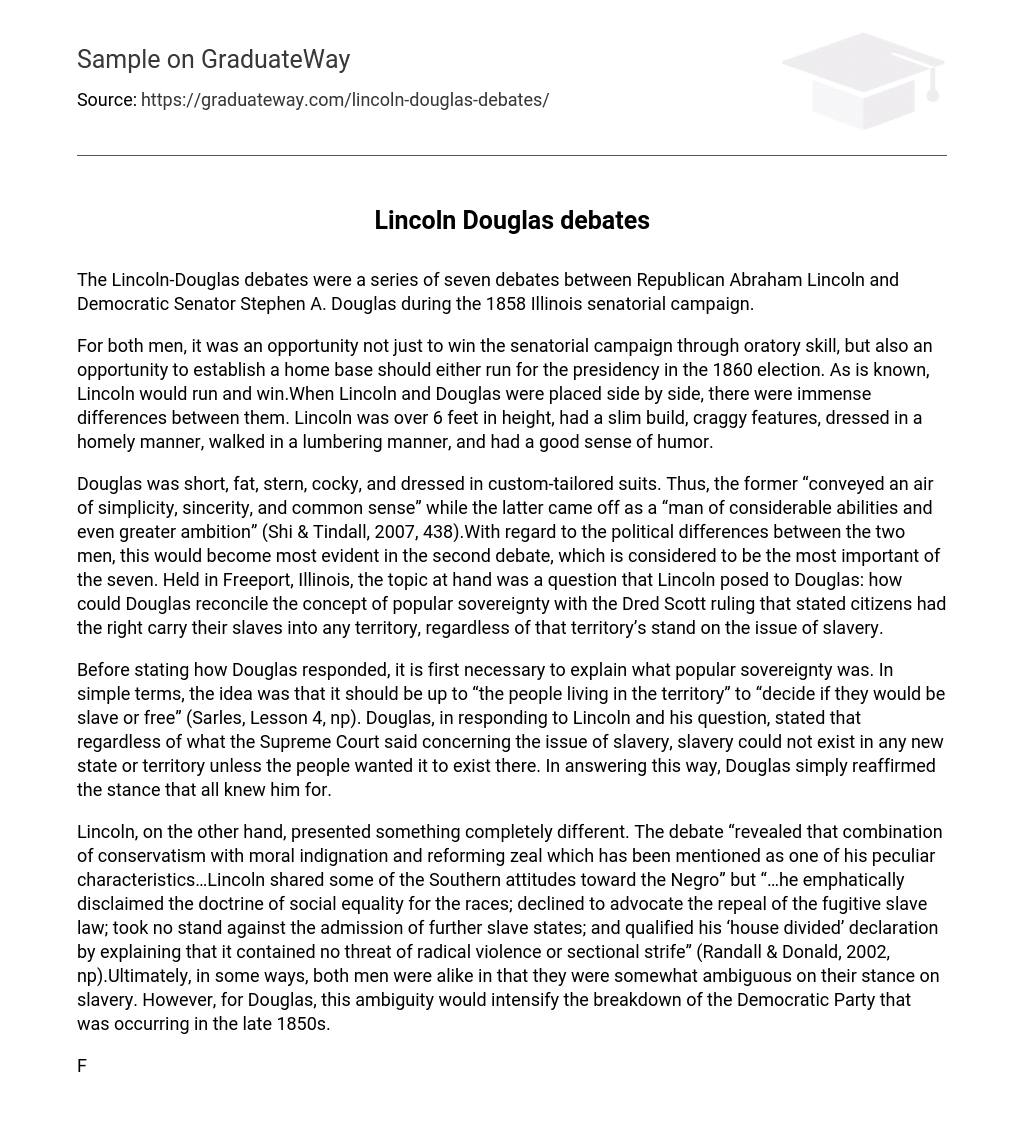The Lincoln-Douglas debates were a series of seven debates between Republican Abraham Lincoln and Democratic Senator Stephen A. Douglas during the 1858 Illinois senatorial campaign.
For both men, it was an opportunity not just to win the senatorial campaign through oratory skill, but also an opportunity to establish a home base should either run for the presidency in the 1860 election. As is known, Lincoln would run and win.When Lincoln and Douglas were placed side by side, there were immense differences between them. Lincoln was over 6 feet in height, had a slim build, craggy features, dressed in a homely manner, walked in a lumbering manner, and had a good sense of humor.
Douglas was short, fat, stern, cocky, and dressed in custom-tailored suits. Thus, the former “conveyed an air of simplicity, sincerity, and common sense” while the latter came off as a “man of considerable abilities and even greater ambition” (Shi & Tindall, 2007, 438).With regard to the political differences between the two men, this would become most evident in the second debate, which is considered to be the most important of the seven. Held in Freeport, Illinois, the topic at hand was a question that Lincoln posed to Douglas: how could Douglas reconcile the concept of popular sovereignty with the Dred Scott ruling that stated citizens had the right carry their slaves into any territory, regardless of that territory’s stand on the issue of slavery.
Before stating how Douglas responded, it is first necessary to explain what popular sovereignty was. In simple terms, the idea was that it should be up to “the people living in the territory” to “decide if they would be slave or free” (Sarles, Lesson 4, np). Douglas, in responding to Lincoln and his question, stated that regardless of what the Supreme Court said concerning the issue of slavery, slavery could not exist in any new state or territory unless the people wanted it to exist there. In answering this way, Douglas simply reaffirmed the stance that all knew him for.
Lincoln, on the other hand, presented something completely different. The debate “revealed that combination of conservatism with moral indignation and reforming zeal which has been mentioned as one of his peculiar characteristics…Lincoln shared some of the Southern attitudes toward the Negro” but “…he emphatically disclaimed the doctrine of social equality for the races; declined to advocate the repeal of the fugitive slave law; took no stand against the admission of further slave states; and qualified his ‘house divided’ declaration by explaining that it contained no threat of radical violence or sectional strife” (Randall & Donald, 2002, np).Ultimately, in some ways, both men were alike in that they were somewhat ambiguous on their stance on slavery. However, for Douglas, this ambiguity would intensify the breakdown of the Democratic Party that was occurring in the late 1850s.
For Lincoln, it would pave the way for him to enter the White House in 1860, and his four years of service would be marred by the bloodiest war in American history. Furthermore, he would be forced to take a stand on the very issue on which he was most ambiguous – slavery. The stand he took would have repercussions that are still felt in American society today. Works CitedDonald, David Herbert & Randall, J.
G. The Civil War and Reconstruction.http://www.civilwarhome.
com/lincolndouglas.htm, 2002. Sarles, John. “Lesson 4.
” History 1321, UIW. Shi, David Emory & Tindall, George Brown. America: A Narrative History. (7th ed.
) New York: W. W. Norton & Company, 2007





